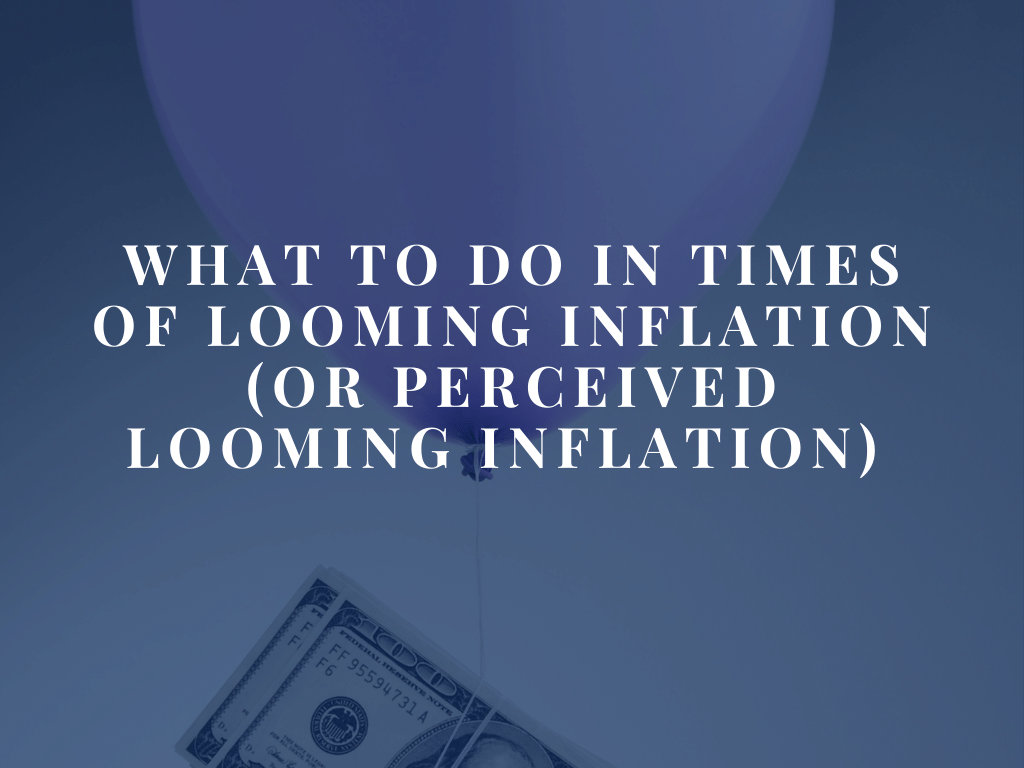
Are we headed into a time of inflation? Many people and economists are debating this issue right now. In the “real world,” we’ve seen inflation in interesting areas such as Pokémon and NBA Top Shots trading “cards,” which had seen a spike up in prices earlier in the year. Housing prices are certainly rising. Plus, inflation is finding its way into commodities such as food inputs like soybeans, corn and more. Certainly, gas prices are higher at the pump than a year ago. And does it mean inflation is coming because of crazy high auction prices for things such as Jack Dorsey selling his first tweet ever as an NFT (non fungible token) for over $2.9 million?
Inflation, or even the specter of perceived inflation, can cause prices to rise. Some say with the recent $1.9 trillion stimulus, a “wall of money” is entering circulation. With $1,400 per person in stimulus, that's a lot of money chasing goods. But before we get too concerned though, keep in mind that, according to statista.com, the inflation rate in the United States in 2019 was 1.81%. The projected rate for this year, 2021, is 2.24%. The highest recent annual rate of inflation in the U.S. since 2010 was 3.14% in 2011.
With all the talk of inflation, it is important to remember that even if real inflation does occur, it can be temporary. Either way, here are three things to do in times of inflation or even perceived inflation.
1. Be mentally prepared to pay higher prices. You may already have noticed higher prices if you are driving a vehicle and buying food. It is a balancing act as a consumer to make income and outflows meet within a budget. If you are mentally prepared for higher prices, you can plan ahead and meet them without skipping a beat. You may need to cut back on some things because other things cost more.
2. If you are planning to buy a house, do it sooner rather than wait five-to-10 years. Prices are rising for lumber and other home construction products/inputs. Couple with that, the fact that interest rates are still incredibly low. Many people buy homes based on the payment they can afford rather than total prices. So, with today’s lower interest rates, your payments will be lower. If inflation comes, it generally erodes the purchasing power of your dollar. Older people may remember when inflation was high, and we had mortgage interest rates in the double digits. Somehow, we survived. Many younger consumers may be used to rates going down to finance a home, car, or business. Higher rates may be a shock. So if you’re considering a home purchase, doing it sooner may help your budget go further.
3. Be aware that growth stocks may be negatively affected if inflation continues. Prices for stocks are affected by inflation. Growth stocks (those just becoming profitable or yet to reach profitability) are more affected because their value is based on their future earnings potential, as opposed to established companies. The market may discount and give lower valuations to high growth, more rapidly growing new businesses. The return of sustained inflation would hurt growth stocks because their future earnings are discounted at a higher rate.
Tech Innovations May Offset Inflation Pressures
It’s not all doom and gloom. Inflation or times of rising prices are about too much money chasing too few goods. It is an age-old fact that one way to reduce prices is to have prices go up. It is all about supply and demand. For example, when home prices go higher, more people will list their homes for sale. Also, the world is made more efficient because of technology. For years, technological advances have brought prices down. Manufacturing, robotics, and automation have created great efficiencies, which help lower costs. If times of inflation do come, keep in mind they may be temporary.
The opinions presented are subject to change without notice in reaction to shifting market conditions. Information provided is believed to be accurate as of the date of original publication and some data was obtained from third party sources. Although these sources are widely used, and Carnegie deems these sources reliable, Carnegie makes no guarantee as to the accuracy of the information provided by these third parties. Past performance is not a guarantee of future results.
Need a Financial Advisor?
If you are currently looking for help with financial planning, contact us. We are happy to schedule an introductory meeting at your convenience.



